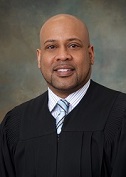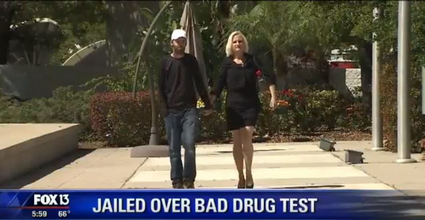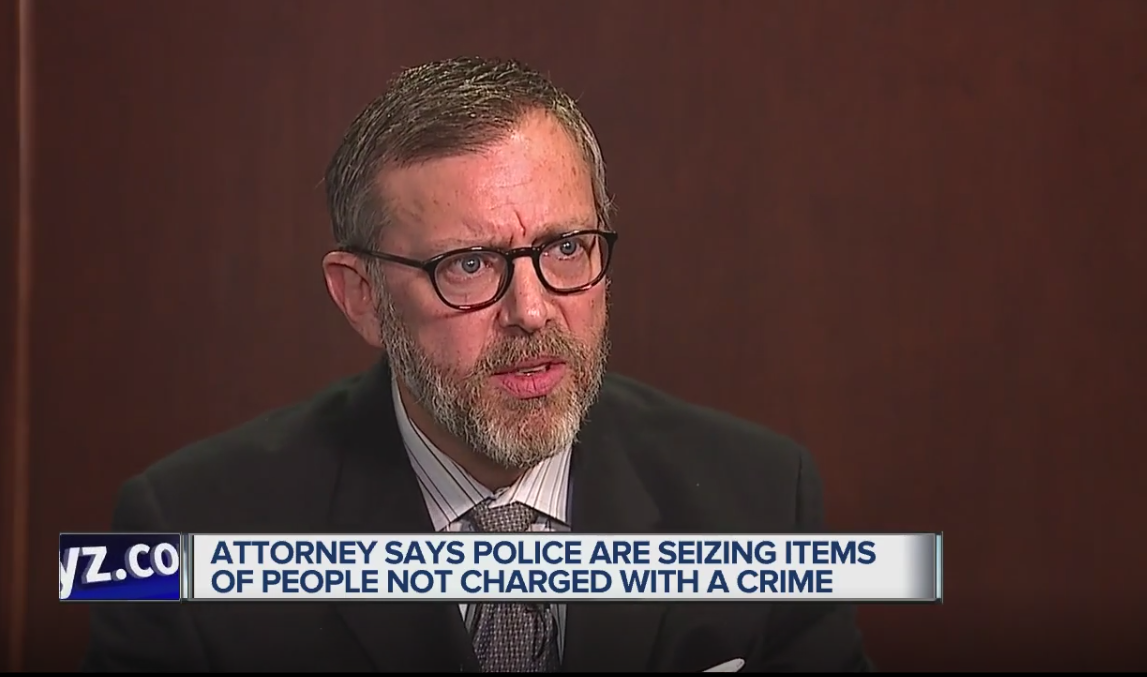
Aug 2, 2018 | Blog, News, Recent Victories
July 31, 2018 – A Judge dismissed felony charges against six people arrested in a raid of a Detroit medical marijuana grow facility.
2 months ago, the authorities raided what they believed was an illegal marijuana grow operation in Detroit.
But an attorney in the marijuana business now says all the charges have been dropped.
FOX 2 TV Report
All charges against Curtis Williams, 36; Cotea Jeanne Walsh, 37; Jones, 53; Travis Davison, 27; Jabari Currie, 31; and James Frazier, 32, of Detroit, were dismissed following a raid in the city of Detroit on May 29, 2018.

“We knew that it had to go this way. Fundamental fair play, you come to expect that to a certain degree,” says lawyer Thomas Lavigne. He represents Viola Brands, the cannabis company operating in southwest Detroit that police and federal agents raided back in May.
The Wayne County Prosecutor’s Office says the court held that the defendants, Viola Employees, operated in good faith in complying with the law and the number of plants they could have inside the building, and it was on the City of Detroit to inform them about what was required – and it failed to do so.
But a defense attorney says Viola had less than the maximum of 1,500 plants in the building and all of its affairs, from its temporary state license to its certificate of occupancy, were in order.
SEE TEMPORARY PROVISIONING CENTER LIST HERE

Judge Kenneth King of 36th District Court dismissed the case “in the interest of fairness.”
Komorn Law has represented numerous clients through the legal chaos of starting up a business in the Michigan Medical Marihuana Industry.
Contact Us For More Information.
800-656-3557

Aug 1, 2018 | Blog, News, Recent Victories
July 31, 2018 -A Detroit Judge dismissed felony charges against six people arrested in a raid of a Detroit medical marijuana grow facility.
All charges against Curtis Williams, 36; Cotea Jeanne Walsh, 37; Jones, 53; Travis Davison, 27; Jabari Currie, 31; and James Frazier, 32, of Detroit, were dismissed following a raid in the city of Detroit on May 29, 2018.

Charges included felony drug delivery and manufacturing charges, both carrying up to 15 years in prison.
Prosecutors argued that the facility on the 4400 block of West Jefferson Avenue was not licensed to grow marijuana.

(Photo: Detroit Police Department)
The Detroit Police Department’s Gang Intelligence Unit executed a search warrant at the medical marijuana facility and seized 200 marijuana plants, about $1 million worth, authorities said.
“Over 1,000” plants were found in the raid, according to the Wayne County prosecutor’s office.
Officers seized marijuana and held employees at gunpoint during the May 29 raid, according to Harrington and his partners in the Denver-based marijuana company Viola Brands.
All cannabis at the site was taken, the business’ accounts were frozen and employees’ vehicles were seized, according to the company.
A defense attorney in the case, Michael Komorn, said the facility was granted a temporary operation’s certification from the city, allowing up to 1,500 plants while the facility waited for the filing process to be approved by the city. Komorn said the Wayne County Prosecutor’s Office made the argument that the facility only was allowed to sell, and not grow, at the facility.
“That’s absurd,” Komorn said. “It’s a semantic issue because I would say everyone would understand that if they’ve been given permission to sell it, of course a medical marijuana caregivers center includes growing and cultivating marijuana.”
The grow op’s certificate of occupancy from the city stated the intent for a greenhouse at the site, and the operation holds a temporary Class C license under Michigan’s Medical Marihuana Facilities Licensing Act allowing up to 1,500 plants, said 36th District Court Judge Kenneth King.
Judge Kenneth King of 36th District Court dismissed the case “in the interest of fairness.”

“In the interest of fairness and in the spirit of always trying to do the right thing, this court is left with no other choice but to dismiss this matter,” the judge said.
King said he stayed up until 3:30 a.m. reading briefs in the case and sorting out the web of acronyms tied to Michigan’s medical marijuana law and the “seed-to-sale” tracking and tax, regulation and licensing system for marijuana growers and dispensaries that took effect late last year.
“That kind of leads me to the burning question: if you’re able to dispense but you can’t grow it, how are you supposed to get it? Where are you supposed to get it from?”
“I don’t believe the police had any malintent. The police are doing their job,” King said. “I think the real blame lies on the documents that were submitted and someone didn’t pay close attention to what the defendants were asking for.”
Komorn said King understood his argument, and said the judge responded: “That kind of leads me to the burning question: ‘If you’re able to dispense but you can’t grow it, how are you supposed to get it? Where are you supposed to get it from?’ ”
The case had been set for a preliminary exam Tuesday. King said he expected his ruling to be appealed regardless of whether it favored the prosecution or defense.
Here is a statement from the Wayne County Prosecutor’s Office:
“I have confirmed that the court granted the defense motion to dismiss the case. However, I don’t have a written opinion.
“It is my understanding that the court held that the defendants operated in good faith regarding all the provisions of the law that they knew about the class C license (1500 plants) for a grow operation. The duty was on the city of Detroit to inform them about what was required and they failed to do so.”
All charges were dismissed Tuesday July 31, 2018.
Also…Michigan voters will decide on a ballot question Nov. 6 that would legalize and tax recreational marijuana for users 21 and older. Medical marijuana was legalized in Michigan via a ballot proposal in 2008.
See the FOX 2 News Report
Komorn Law has represented numerous clients through the legal chaos of starting up a business in the Michigan Medical Marihuana Industry.
Contact Us For More Information.
800-656-3557

Jun 18, 2018 | Blog, News
A mother with no criminal record of 4 separated from her family and children after being jailed for vitamins being mistaken for drugs in a widely used drug test kit by police.
These Duquenois Levine reagent tests for marijuana will test positive for most any substances, candies, even the air will make them change color and false positive alert for a controlled substance.
Never consent to a search by a police officer. Tell the officer you do not consent to a search and ask if you are free to go. Don’t answer any questions , tell the officer you want your lawyer present during any questioning. These important phrases will keep you out of trouble and protect your constitutional rights!

May 14, 2018 | Blog, News
Our Editorial: Get cops out of fencing racket
The Detroit News | The Detroit News
A bill moving through the state Legislature would get police out of the petty theft racket, but would leave the door open for them to continue engaging in grand larceny. Still, it’s an important step, and the measure should be adopted.
Civil asset forfeiture is an affront to constitutionally protected property rights and the fundamental legal concept of innocent until proven guilty. And yet it is practiced by nearly all of Michigan’s law enforcement agencies and protected by state law.
The House bill pushed by Speaker Tom Leonard, R-DeWitt, would drastically restrict this legalized theft.
The bill, HB 4158, would require a conviction before most private property could be seized from individuals and transferred to the government.
That may seem like a common sense condition, and certainly a fair one, but that is not the current practice in Michigan.
Here, police are able to grab property on the mere suspicion that it was gained from or helped facilitate criminal activity. In fact, 10 percent of those who have their assets seized are never criminally charged.
Getting the property back is a cumbersome and expensive process, and many of those whose possessions were taken find the effort to recover them not worth the time and money.
Property that is seized is most often sold and the proceeds used to fund police operations. That provides a perverse incentive for cops to find a connection between the assets and a suspected crime.
In a number of cases, cash and other items have been taken from houses and automobiles even when no trace of drugs or other illegal contraband is found inside.
In 2016, $15.3 million in private property was seized under the civil asset forfeiture law. Some years, the value has reached $25 million.
Three years ago the Legislature reformed the law to raise the standard of evidence required before property can be taken, and also demanded better accounting from police agencies about why assets were confiscated.
That has cut into the total amount taken, but the practice of grabbing private property without a conviction has continued. It would end under the House bill, at least for smaller seizures.
The proposed bill would still permit seizures of assets valued above $50,000, on the theory that such big-ticket items are a likely indication of drug activity. That reasoning is obviously flawed. There are a lot of non-criminal reasons someone may possess that much cash or other property.
Police should not be operating on assumptions. No property should be taken and held without enough evidence for a criminal conviction.
Law enforcement agencies are lobbying the Legislature hard to scrap the bill, arguing forfeiture is an important tool in combatting the drug trade. In reality, it has become a vital piece of their operating budgets.
If police need more money, raise taxes, but don’t steal the property of citizens.
Lawmakers should get police out of this sordid business by ending civil asset forfeiture in cases where no one has been convicted of a crime.
See Detroit News Artcle

Apr 9, 2018 | Blog, Michigan Medical Marijuana Criminal Defense Attorney Michael Komorn, Recent Victories, Victories Project
People v VD.
BACKGROUND:
In June 2014, Defendants home in Rochester Hills was raided by police. The raid resulted in the discovery of an alleged 3,379 grams of marijuana clippings and 113 marijuana plants. The police also found digital scales. Both defendants were charged in Oakland County with manufacturing 20 or more plants and possession with intent to deliver.
Issue:
Defense brought a motion for dismissal of the case based on the belief that their actions as caregivers and patients were protected under the section 8, Medical marijuana Defense. There are three requirements necessary to prove this defense, but in this case the only contested issue is Rule 8(a)(2).
Rule:
Rule 8(a)(2): The patient and the patient’s primary caregiver, if any, were collectively in possession of a quantity of marijuana that was not more than was reasonably necessary to ensure the uninterrupted availability of marijuana for the purpose of treating or alleviating the patient’s serious or debilitating medical condition or symptoms of the patient’s serious or debilitating medical condition.
Analysis:
The main issue in this rule is determining what is “reasonably necessary” to provide the patient with an uninterrupted availability of marijuana to treat the patient’s serious or debilitating medical condition.
Each of the patients testified to the existence of their serious and/or debilitating medical conditions and to their monthly medicinal needs.
The combined needs of these registered patients was found to be approximately 14 lbs (224 ounces) per month.
It was testified to during the hearing, that out of the alleged 110 ounces of marijuana the police had confiscated, only about 4 lbs (64 ounces) of the plant were actually usable medicine.
Based on the needs of these patients the amount of usable medicine that was found in possession of the caregiver was enough to adequately supply his patients for only 8.5 days!
With respect to the 113 marijuana plants found in the Defendant’s home: Defendant testified that the next harvest would consist of 39 plants that would produce roughly 7.5 pounds (120 ounces) of usable marijuana.
The court concluded on this issue that, given the facts provided:
“the Defendants did not possess more marijuana plants than was reasonably necessary to ensure the uninterrupted availability of marijuana for the purpose of treating and alleviating the debilitating medical condition of Joseph and the patients.”
Prosecution claimed that total amount of plants and marijuana was not reasonably necessary, but backed these claims with no evidence. Instead, Prosecution tried to claim that since there was a significant portion of the plant that had to be thrown away, due to lacking medical benefits, that not all of the plant material produced is “reasonably necessary”.
The court responded to this argument unequivocally:
“common sense dictates that it was necessary for Defendants to grow enough plants, which necessarily includes growing leaves, to acquire sufficient marijuana flower or buds to provide to the patients. The fact that Defendants were essentially essentially forced to discard portions of the marijuana plant tat could not be used to treat patients does not, in this court’s opinion establish that Defendants possessed more marijuana than was reasonably necessary.”
Conclusion: The court found that the defense successfully presented prima facie evidence regarding MCL 333.26428(a)(2). Furthermore, the court found that no question of fact existed. As a result, the court determined that Defendant’s are entitled to a dismissal of their case.







